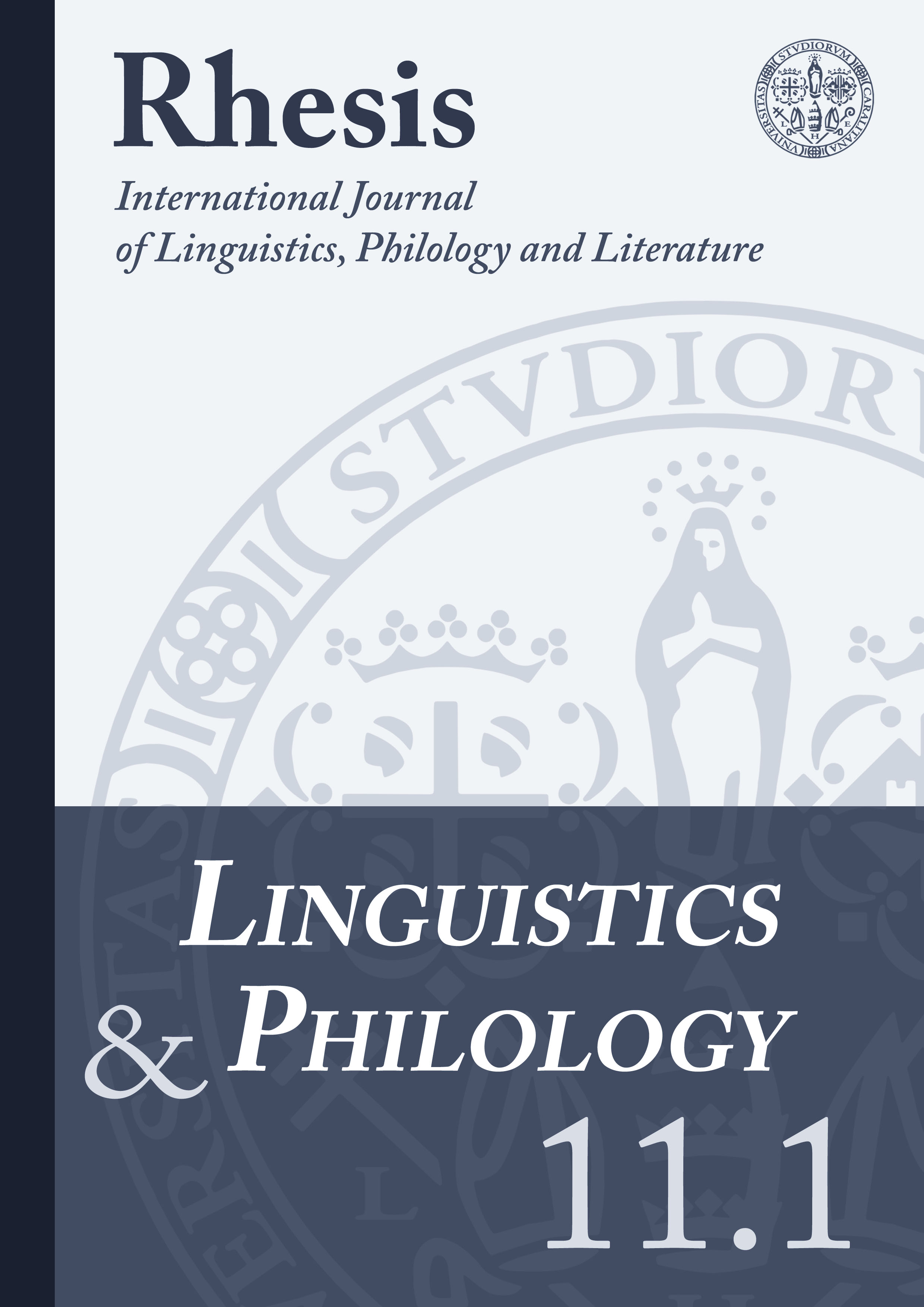Comandi straordinari e manipolazione dell’emergenza nel dibattito politico tra il 59 e il 49 a.C.
Abstract
During the 1st century BCE the granting of extraordinary commands was – as it had been in the previous period – the subject of heated and sometimes violent debate. The opponents of these measures used to warn against the risks deriving from the novitas of the law and from the centralisation of great power in the hands of single individuals. This particular aspect has already been highlighted in many studies on the subject; this article intends rather to demonstrate that, between 59 and 49, the generals who had received such commands were often accused of having exploited the emergency theme in order to obtain or keep their power. An excursus among the extraordinary grants of this decade will therefore display the modalities, timing and purposes by which the opposition made use of this argument. At the same time, I will try to clarify whether these charges corresponded to the truth or if they were themselves the result of manipulation. Eventually, the analysis of available data will show that the perception of danger and crisis was variously instrumentalised for personal purposes by all the parties involved.
Downloads
References
Angeli Bertinelli, Maria Gabriella; Carena, Carlo; Manfredini, Mario; Piccirilli, Luigi (1993), Plutarco: Le Vite di Nicia e di Crasso, Milano, Mondadori, Fondazione Lorenzo Valla.
Arena, Valentina (2012), Libertas and the Practice of Politics in the Late Roman Republic, Cambridge, Cambridge University Press.
Bellardi, Giovanni (1975), Le Orazioni di M. Tullio Cicerone. Volume terzo. Dal 57 al 52 a.C., Torino, UTET.
Brennan, T. Corey (2000), The Praetorship in the Roman Republic, Oxford, Oxford University Press.
Broughton, Thomas R. S. (1952), The Magistrates of the Roman Republic, II: 99 B.C. – 31 B.C., New York, American Philological Association.
Cesa, Maria (2007), ‘Riflessioni sulla composizione del De bello Gallico’, in Desideri, Paolo (ed.), Antidoron: studi in onore di Barbara Scardigli Forster, Pisa, ETS, 37-49.
Fezzi, Luca (1999), ‘La legislazione tribunizia di Publio Clodio Pulcro (58 a.C.) e la ricerca del consenso a Roma’, Studi Classici e Orientali 47 (1), 245-341.
Fezzi, Luca (2019), Pompeo. Conquistatore del mondo, difensore della res publica, eroe tragico, Roma, Salerno Editrice.
Gagliardi, Lorenzo (2011), Cesare, Pompeo e la lotta per le magistrature, Milano, Giuffrè.
Gardner, Jane F. (1983), ‘The “Gallic Menace” in Caesar’s Propaganda’, Greece & Rome 30 (2), 181-189.
Girardet, Klaus M. (2007), Rom auf dem Weg von der Republik zum Prinzipat, Bonn, Habelt.
Grillo, Luca (2015), Cicero’s De Provinciis Consularibus Oratio, Oxford, Oxford University Press.
Keaveney, Arthur (1982), ‘The King and the War-Lords: Romano-Parthian Relations circa 64-53 B.C.’, The American Journal of Philology 103 (4), 412-428.
Kennedy, David (1996), ‘Parthia and Rome: Eastern Perspectives’, in Kennedy, Daniel (ed.), The Roman Army in the East [Special issue], Journal of Roman Archeology Supplementary Series 18, 68-90.
Krebs, Christopher B. (2018), ‘More than Words. The Commentarii in their Propagandistic Context’, in Grillo, Luca; Krebs, Cristopher B. (eds.), The Cambridge Companion to the Writings of Julius Caesar, Cambridge, Cambridge University Press, 29-42.
Leach, John D. (1983), Pompeo, Milano, Rizzoli (Pompey the Great, London, Croom Helm, 1978). Łoposzko, Tadeusz (1979), ‘La famine à Rome en 57 avant J.-Chr.’, Quaderni di Storia 10, 101-121.
Marshall, Bruce A. (1976), Crassus: A Political Biography, Amsterdam, Adolf M. Hakkert.
Meriani, Angelo (1998), Vite di Plutarco. Traduzione di R. Giannattasio Andria, 6, Torino, UTET.
Nisbet, Robin G. M. (1961), M. Tulli Ciceronis In L. Calpurnium Pisonem oratio, Oxford, Clarendon Press.
Rickman, Geoffrey (1980), The Corn Supply of Ancient Rome, Oxford, Clarendon Press.
Ridley, Ronald T. (1981), ‘The Extraordinary Commands of the Late Republic: A Matter of Definition’, Historia: Zeitschrift für Alte Geschichte 30 (3), 280-297.
Ridley, Ronald T. (1983), ‘Pompey’s Commands in the 50’s: How cumulative?’, Rheinisches Museum für Philologie 126 (2), 136-148.
Riggsby, Andrew M. (2006), Caesar in Gaul and Rome: War in Words, Austin, University of Texas Press.
Romano, Elisa (2006), ʻ“Allontanarsi dall’antico”. Novità e cambiamento nell’antica Romaʼ, Storica 12, 7-42.
Rotondi, Giovanni (1962) [1912], Leges Publicae Populi Romani, Hildesheim, Georg Olms.
Ruffing, Kai (1993), ‘Ein Fall von politischer Getreidespekulation im Jahr 57 v. Chr. in Rom?’, Münstersche Beiträge zur antiken Handelsgeschichte 12 (1), 75-93.
Seager, Robin (20022) [1979], Pompey: A Political Biography, Malden-Oxford-Melbourne, Blackwell.
Straumann, Benjamin (2016), Crisis and Constitutionalism: Roman Political Thought from the Fall of the Republic to the Age of Revolution, New York, Oxford University Press.
Tatum, W. Jeffrey (1999), The Patrician Tribune. Publius Clodius Pulcher, Chapel Hill-London, The University of North Carolina Press.
Vervaet, Frederik J. (2010), ‘Arrogating Despotic Power through Deceit: The Pompeian Model for Augustan dissimulatio’, in Turner, Andrew; Kim On Chong-Gossard, James H.; Vervaet, Frederik J. (eds.), Private and Public Lies: The Discourse of Despotism and Deceit in the GraecoRoman World, Leiden-Boston, Brill, 131-166.
Vervaet, Frederik J. (2014), The High Command in the Roman Republic. The Principle of the summum imperium auspiciumque from 509 to 19 BCE, Stuttgart, Steiner.
Ward, Allen M. (1977), Marcus Crassus and the Late Roman Republic, Columbia, University of Missouri Press.
Williams, Richard S. (1980), Aulus Gabinius: A Political Biography, Ann Arbor-London, University Microfilms International.
Wiseman, Timothy P. (1998), ‘The Publication of De bello Gallico’, in Welch, Kathryn; Powell, Anton (eds.), Julius Caesar as Artful Reporter: The War Commentaries as Political Instruments, London, The Classical Press of Wales, 1-9.
Yakobson, Alexander (2009), ‘Public Opinion, Foreign Policy and ‘Just War’ in the Late Republic’, in Eilers, Claude (ed.), Diplomats and Diplomacy in the Roman World, Leiden, Brill, 45-72.



